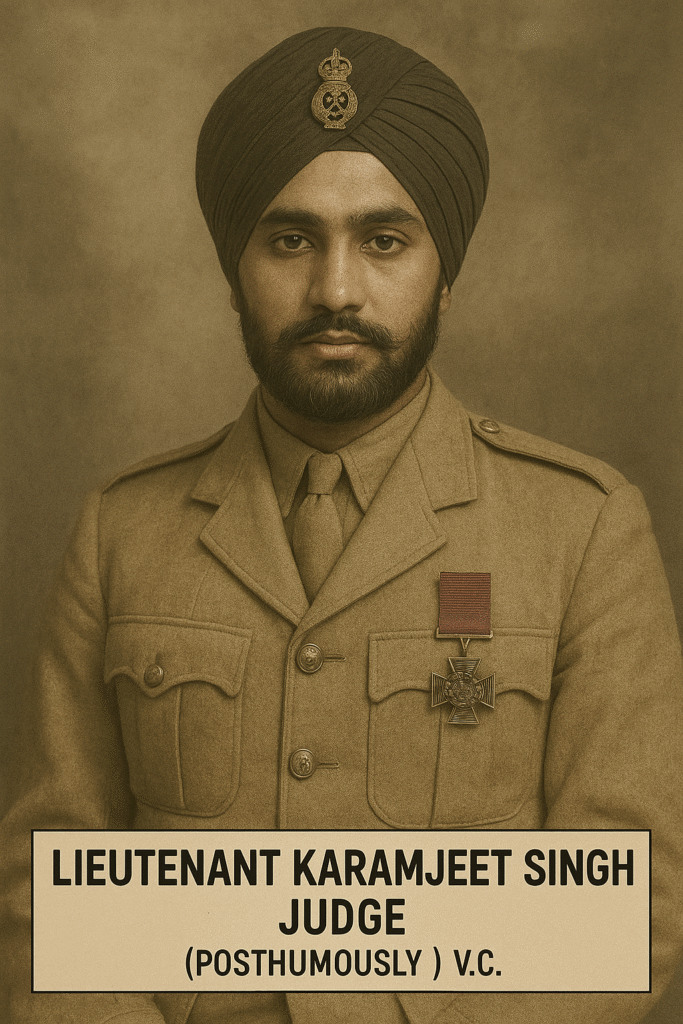Sikh Soldiers Who Won the Victoria Cross in the First and Second World War
The Victoria Cross (VC) is the highest and most prestigious military decoration awarded by the British Armed Forces. It is conferred “for valour in the presence of the enemy”, recognizing the most exceptional acts of bravery and sacrifice on the battlefield.
Instituted by Queen Victoria on 29 January 1856, the award was created to honour acts of courage displayed during the Crimean War (1854–1856).
Key Facts About the Victoria Cross:
- It is awarded for extraordinary bravery in direct confrontation with the enemy.
- It can be awarded to individuals of any rank, service branch, or social background.
- The decoration may be awarded posthumously, honouring those who made the ultimate sacrifice.
- The medal is made of bronze, traditionally believed to be cast from captured Russian cannons from the Crimean War.
- The front of the medal features a lion standing atop the Royal Crown, with the words “FOR VALOUR” inscribed below.
- It is suspended from a crimson ribbon (before 1918, naval awards featured a blue ribbon).
- The reverse side of the medal bears the date of the act of bravery, along with the recipient’s name, rank, and unit.
In the British honours system, the Victoria Cross holds the highest precedence, ranking above all other orders and medals. Recipients are entitled to use the post-nominal letters “VC” after their names.
Sikhs Awarded the Victoria Cross
Captain Ishar Singh
The Immortal Saga of the First Sikh Recipient of the Victoria Cross
When the annals of history search for the finest examples of bravery, there are names that inscribe themselves in golden letters. One such name is Captain Ishar Singh, the first Sikh soldier to be awarded the Victoria Cross, the highest military decoration of the British Empire for gallantry in the face of the enemy. His story is not merely about a medal, but a living narrative of courage, duty, devotion, and the proud legacy of the Sikh tradition- one that continues to inspire generations.
A Brave Son is Born: The Dawn of a Military Journey
Born on the sacred soil of British India, where valor and service were life’s calling, Ishar Singh hailed from a devout Sikh family. From a young age, he embodied the virtues of discipline, selfless service, and fearless resolve. He began his military service as a sepoy in the 28th Punjabis, at a time when over 1.3 million Indian volunteers had enlisted in the British forces to fight on the battlefronts of World War I.
Heroism on the Front: The Waziristan Campaign
April 10, 1921– a date etched in the chronicles of valor. On the treacherous Waziristan front near Haidari Kach in the North-West Frontier, Sepoy Ishar Singh, then 25 years old, was stationed in a Lewis gun section of his regiment.
As enemy forces launched a fierce and sudden assault, Singh was struck in the chest by a bullet and collapsed. Most of his commanding officers and NCOs were either killed or wounded. In that critical moment, the enemy seized the Lewis gun — a vital weapon for defense.
But Ishar Singh rose. Bleeding and wounded, he rallied two comrades, launched a counterattack, reclaimed the gun, and re-established his post. His indomitable courage not only safeguarded his troop but also shifted the tide of the battle.
Beyond Duty: A Testament of Sacrifice
When ordered by his Jamadar to retreat and seek medical aid, he refused. Instead, he tended to his wounded comrades, bringing water from the river under continuous enemy fire. He made several trips, driven only by a desire to ease the suffering of the injured.
When a medical officer was dressing a wounded soldier, Singh stood between him and the enemy, offering his own body as a shield. For three relentless hours, he defied death- until he collapsed from extreme blood loss while being evacuated.
The Victoria Cross: A Well-Deserved Honor
On 25 November 1921, the London Gazette published the official citation honoring Ishar Singh with the Victoria Cross. Awarded solely for “most conspicuous bravery in the face of the enemy,” this decoration was a recognition of not just personal valor but the global acknowledgment of Sikh heroism.
Reflections of Sikh Spirit
Captain Ishar Singh fought not just with weapons, but with the soul of a true Sahibzada of the Sikh faith. His gallantry was interwoven with humility and seva (selfless service)- the very essence of Sikhism.
His descendants now reside in Melbourne (Australia) and Calgary (Canada), where his story is still narrated with pride and reverence by the family.
Beyond Praise: An Officer’s Testimony
His commanding officer, Captain Bernard Oddie, nominated him for the Victoria Cross, stating:
“His bravery and devotion to duty were beyond praise. His conduct inspired all who witnessed it.”
Rising in Ranks and Honors
Captain Ishar Singh later rose to the rank of Captain, served with distinction in World War II, and was further honored with the Order of British India, First Class, along with the revered title of “Sardar Bahadur.”
Today, his Victoria Cross medal is preserved in the Lord Ashcroft Collection, a testament to a timeless legacy.
Epilogue: A Legend Lives On
Captain Ishar Singh’s life was untouched by fear or hesitation. He upheld the dignity of his faith through action, and even in pain, he chose service above self. He not only conquered the battlefield but etched his presence in the hearts of posterity.
His life teaches us:
“True valor is not just forged in battle, but in compassion, selflessness, and unwavering duty.”
Captain Ishar Singh was not just a soldier, he is an eternal idea, one that teaches us to live courageously and serve humanity with grace.
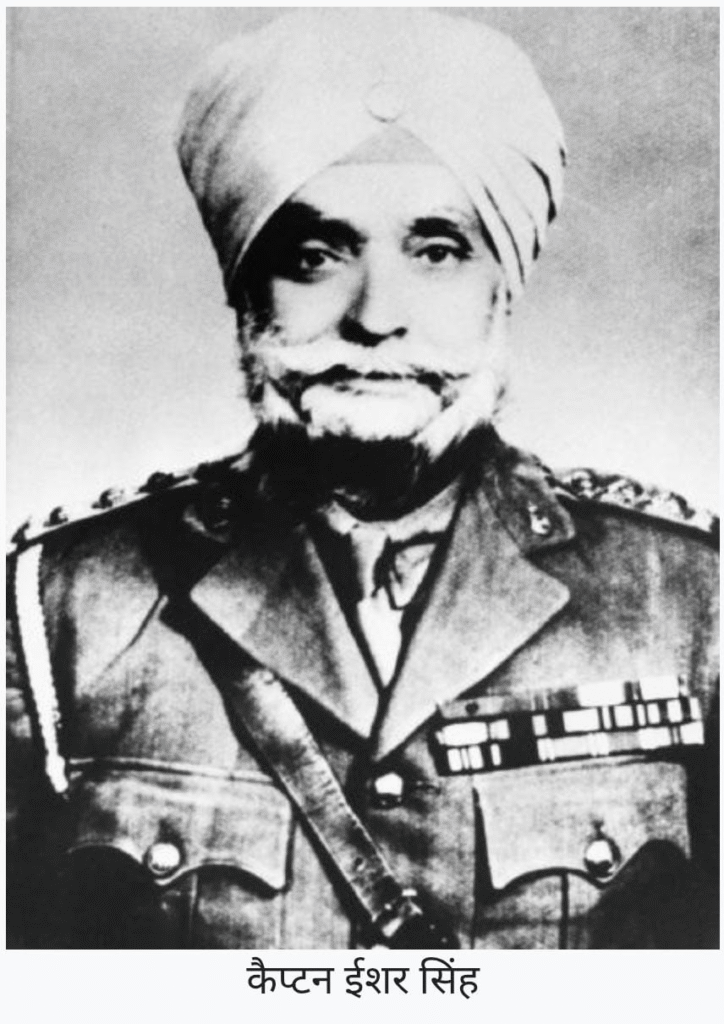
A Brief Biography of Subedar Khushal Singh
Subedar Khushal Singh was born in a small village in the Punjab province of British India (now in Pakistan). While detailed information about his birthdate and early life is not readily available, it is known that he joined the British Indian Army in his youth, demonstrating his valor and dedication to duty from the outset. His physical prowess, discipline, and unwavering courage soon earned him respect among his comrades and officers.
Khushal Singh was a part of the 27th Bombay Pioneers, a distinguished engineering regiment of the British Indian Army. The soldiers of this regiment specialized in constructing bridges, repairing roads, and undertaking other vital construction work, often near the battlefield and under the direct threat of enemy fire. This work demanded not only technical skill but also indomitable courage and patience, and Khushal Singh was the epitome of these qualities.
During World War I (1914-1918), the 27th Bombay Pioneers served in various significant theaters of war. Khushal Singh displayed remarkable bravery in numerous challenging situations during this period. His comrades remember him as a calm, determined, and dutiful soldier who never wavered in the face of adversity and was always ready to assist his fellow soldiers.
Khushal Singh was posthumously awarded the Victoria Cross (VC). The Victoria Cross is the highest military decoration, awarded for valor “in the presence of the enemy” to members of the British and Commonwealth armed forces. The historical records offer slightly different accounts of the specific action for which Khushal Singh received this honor.
According to some sources, he was awarded this honor for his exceptional courage displayed during a crucial battle in Mesopotamia (modern-day Iraq) during World War I. It is said that his platoon was caught in a difficult situation, and despite heavy enemy fire, Khushal Singh not only led his comrades to safety but also single-handedly neutralized several enemy positions. In this action, he disregarded his own safety and ultimately met a heroic death.
Another account suggests that he received the honor for his extraordinary bravery and leadership in a different military engagement, where he stood firm against the enemy while protecting his wounded comrades. Regardless of the precise event that led to his Victoria Cross, it is undeniable that Khushal Singh displayed exceptional valor and self-sacrifice, making him deserving of the highest military honor.
Subedar Khushal Singh’s name is always taken with pride in the list of Indian soldiers who received the Victoria Cross. This honor is not only a symbol of his personal bravery but also a tribute to all the unsung heroes who served in the British Indian Army and sacrificed everything for the nation.
The life and sacrifice of Khushal Singh teach us that dedication to duty, courage, and self-sacrifice are the most important qualities for any soldier. He fulfilled his duty even in the most challenging circumstances and laid down his life to protect his comrades. His story will continue to inspire generations to come.
The name of Subedar Khushal Singh will forever live on among the immortal heroes of Indian military history. His Victoria Cross is a symbol of his indomitable spirit and supreme sacrifice, which will always remind us that there are no limits to bravery and dedication to duty. A hundred salutes to his memory.
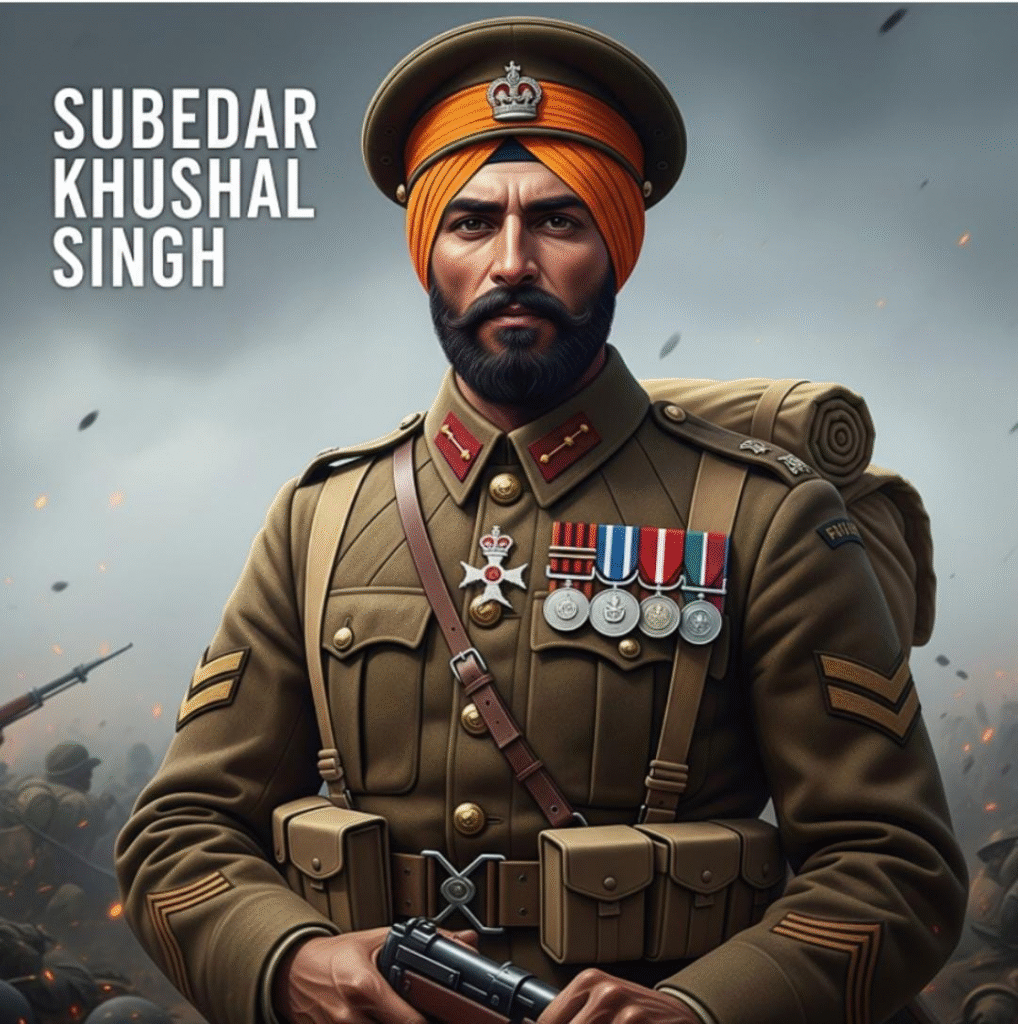
A Brief Introduction to Naik Nand Singh, 1/11th Sikh Regiment
Naik Nand Singh of the 1/11th Sikh Regiment was an extraordinary warrior who was posthumously awarded the Victoria Cross for his incredible bravery and sacrifice during World War II. His life is an inspiring tale of courage, dedication to duty, and patriotism. Here is a brief introduction to him in approximately 1000 words:
Early Life and Background:
Naik Nand Singh was born in 1914 in Bahadar Pur village, Punjab Province, British India (now in Pakistan), into a Sikh family. His father’s name was Shri Bhola Singh and his mother’s name was Smt. Ishwar Kaur. From childhood, Nand Singh was physically strong and had a courageous nature. He received his early education in the village school. The rural environment and Sikh traditions shaped his character and values. A spirit of service and sacrifice was ingrained in him from a young age, likely inspired by the principles and warrior tradition of Sikhism.
Enlistment in Military Service:
In his youth, Nand Singh decided to join the British Indian Army. Given his physical prowess and strong determination, he was enlisted in the 1/11th Sikh Regiment. This regiment was known for its bravery and combat skills. Nand Singh underwent rigorous training in his regiment and emerged as a skilled soldier. He soon earned the respect of his comrades and officers through his dedication and discipline.
Contribution in World War II:
During World War II, the 1/11th Sikh Regiment was deployed in various theaters of war. Naik Nand Singh participated in several significant battles and demonstrated his valor. His bravery during the Burma Campaign is particularly noteworthy.
Burma Campaign and the Victoria Cross:
In May 1944, during the Burma Campaign in the Arakan region, the 1/11th Sikh Regiment was engaged in a crucial battle against the Japanese army. Naik Nand Singh was leading an advance platoon at the time. The Japanese army had heavily fortified a strategically important hill. Capturing this hill was essential for the Allied forces.
Nand Singh and his platoon were ordered to attack this hill. Despite heavy enemy shelling and machine-gun fire, Nand Singh displayed indomitable courage and led his men forward. He single-handedly assaulted three enemy bunkers. By throwing a grenade into the first bunker, he eliminated the enemy soldiers inside. During this action, he was severely wounded, but he did not give up.
Ignoring his serious injuries, Nand Singh charged at the second bunker and destroyed it as well. He sustained even more grievous wounds in this assault, but his resolve remained as firm as a rock. He inspired his soldiers to press forward.
Finally, Nand Singh attacked and captured the third enemy bunker. In this final assault, he received such deep wounds that he succumbed to them shortly after.
Due to the unparalleled bravery and self-sacrifice of Naik Nand Singh, his platoon succeeded in capturing the hill. For his extraordinary heroism and devotion to duty, he was posthumously awarded the Victoria Cross. The Victoria Cross is the highest award for gallantry in the face of the enemy awarded to members of the British and Commonwealth armed forces.
Victoria Cross Citation:
Naik Nand Singh was awarded the Victoria Cross with the following citation:
“Awarded for gallantry: –
The magnificent bravery and supreme devotion to duty displayed by Naik Nand Singh enabled his platoon to achieve its object. He displayed courage and tenacity of the highest order and a complete disregard for his own safety.”
Legacy and Inspiration:
The sacrifice and b uhravery of Naik Nand Singh continue to be a source of inspiration for the Indian Army and the entire nation. His name is etched in the annals of history in golden letters as a synonym for courage and devotion to duty. His story inspires the younger generation to dedicate themselves to the nation.
Several memorials and institutions have been established in his honor. Tales of his bravery are narrated in military training institutions to instill a spirit of valor and sacrifice in soldiers. The life of Naik Nand Singh teaches us that even in the face of adversity, any goal can be achieved with unwavering courage and determination. His sacrifice was not in vain, and he will always live in our memories.
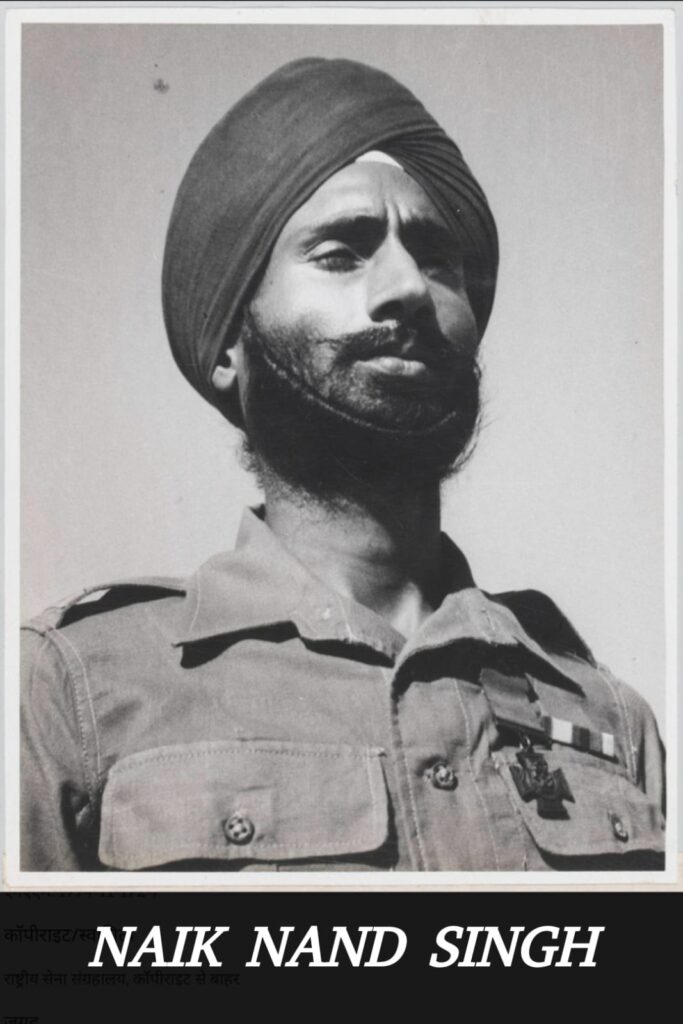
Havildar Prakash Singh: A Saga of Valor and Sacrifice
Havildar Prakash Singh was an exceptional warrior of the Indian Army who, during World War II, displayed unparalleled courage and unwavering devotion to duty, earning him the highest British military decoration, the Victoria Cross (VC). His tale of bravery and sacrifice remains etched in golden letters in the annals of Indian military history.
Prakash Singh was born in 1912 in Chak 25 village, Ropar district of undivided Punjab, into a humble farming family. From his childhood, he was physically strong and possessed a courageous spirit. The fervor of patriotism was deeply ingrained in his veins, and it was this very sentiment that inspired him to join the Indian Army.
In his youth, Prakash Singh enlisted in the 8th Punjab Regiment of the British Indian Army. Due to his dedication, discipline, and physical prowess, he soon carved a distinct identity for himself within his regiment. He was known as a conscientious and skilled soldier, always ready to assist his comrades.
During World War II, the 8th Punjab Regiment was deployed to the Burma (present-day Myanmar) front. This front was a crucial theater of war between the Allied forces and the Japanese army, witnessing fierce battles. Havildar Prakash Singh participated in several significant engagements with his unit, displaying indomitable courage each time.
It was during a decisive battle in the Donbaik area of Burma on January 19, 1943, that Havildar Prakash Singh exhibited the extraordinary valor for which he was posthumously awarded the Victoria Cross. On this day, his platoon was attacking a strongly fortified Japanese position. Heavy enemy fire made it difficult for the Indian soldiers to advance.
In this critical situation, Havildar Prakash Singh took the initiative and, disregarding his own safety, single-handedly charged towards the enemy machine-gun post. Using his rifle and grenades, he launched a fierce assault on the enemy. His sudden and intense action stunned the enemy, and their machine gun fell silent.
Havildar Prakash Singh did not stop there. He then attacked another enemy post and neutralized it as well. Due to his bravery, his platoon was able to advance and successfully capture the enemy stronghold. Throughout this entire action, Havildar Prakash Singh was severely wounded, but he continued to fight relentlessly until the objective was achieved.
For his unparalleled bravery and selfless sacrifice, Havildar Prakash Singh was posthumously awarded the Victoria Cross. The Victoria Cross is the highest award for gallantry in the face of the enemy awarded to members of the British and Commonwealth armed forces.
The citation for Havildar Prakash Singh’s Victoria Cross was published in the London Gazette on March 9, 1943. This gazette detailed his bravery, praising his indomitable courage, leadership qualities, and devotion to duty.
Havildar Prakash Singh’s sacrifice became a source of inspiration for the Indian Army. His story continues to motivate soldiers with the spirit of duty, courage, and sacrifice. He will always be remembered as a valiant warrior who laid down his life for his country and his comrades.
After independence, the Government of India also took several steps to honor Havildar Prakash Singh. Memorials were built in his village and region in his memory, and schools and roads were named after him. Tales of his bravery are still narrated in military academies and schools to inspire the new generation.
The life of Havildar Prakash Singh teaches us that true bravery transcends mere physical strength. It emanates from a sense of duty, courage, and selfless service. He did not give up even in the face of adversity and, by sacrificing his life, ensured victory for his comrades and his nation.
Today, as we remember valiant warriors like Havildar Prakash Singh, we must honor their sacrifice and strive to embody their ideals in our lives. His story reminds us that the price of freedom and security is invaluable, and we must always remain vigilant in upholding it.
Havildar Prakash Singh, a true soldier of the 8th Punjab Regiment and a deserving recipient of the Victoria Cross, will forever remain immortalized in Indian military history. His saga of valor and sacrifice will continue to inspire generations to come.
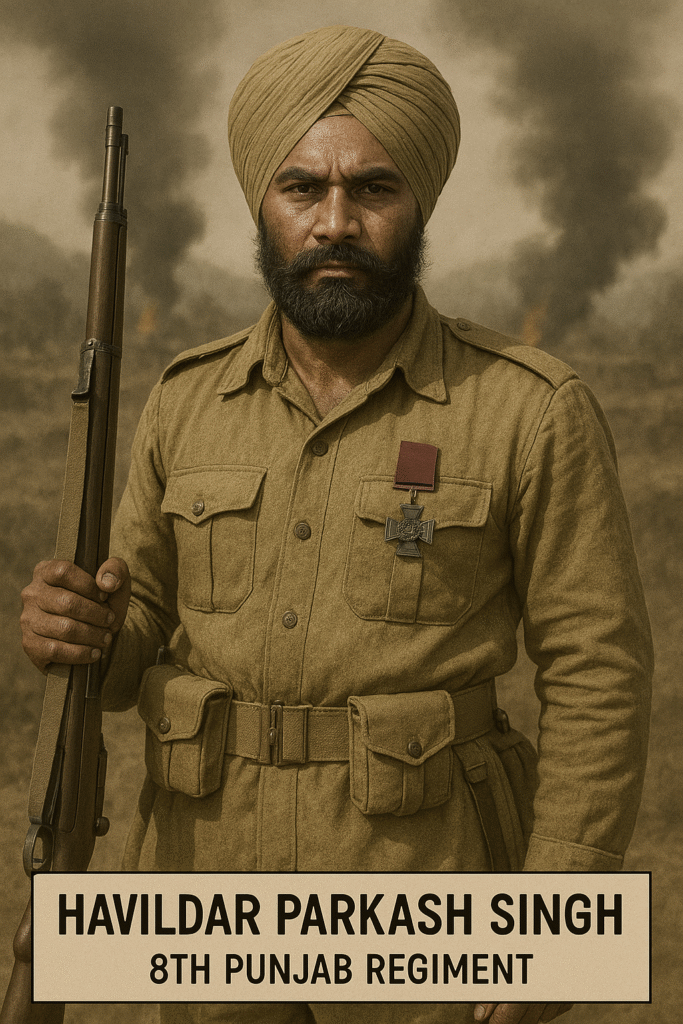
Lieutenant Karamjeet Singh Judge (Posthumous), V.C.
Lieutenant Karamjeet Singh Judge was born in 1912 in Chak Ramdas village, Gujranwala district, Punjab province of undivided India. He received his early education at the local school and then enrolled in Khalsa College, Amritsar for further studies. A talented and enthusiastic young man, Karamjeet Singh displayed leadership qualities from a young age.
In 1941, during World War II, Karamjeet Singh joined the Indian Army and was commissioned into the 4/15th Punjab Regiment. Due to his dedication, discipline, and quick learning ability, he soon earned the respect of his comrades and senior officers. He was known as a courageous and determined officer who always led his men from the front.
During World War II, on 18th March 1945, Lieutenant Karamjeet Singh Judge displayed unparalleled bravery and self-sacrifice during the Battle of Imphal in Burma (present-day Myanmar). His platoon was tasked with attacking a strongly fortified Japanese position. Despite heavy enemy shelling and machine-gun fire, Lieutenant Judge personally led his men in a series of assaults on several enemy bunkers.
In a critical moment, when his platoon was under intense pressure from a strong enemy position, Lieutenant Judge single-handedly advanced and threw grenades at an enemy machine-gun post, neutralizing it. During this courageous action, he was severely wounded but refused to withdraw and continued to inspire his men to advance. Despite his grievous injuries, he kept fighting until the enemy position was captured.
Lieutenant Karamjeet Singh Judge made the ultimate sacrifice in the line of duty. For his exceptional bravery, unwavering determination, and selfless leadership, he was posthumously awarded the Victoria Cross, the highest military decoration of the British Empire. His sacrifice will always be remembered in the annals of Indian military history, and he will continue to be a source of inspiration for generations to come.
The name of Lieutenant Karamjeet Singh Judge is etched in golden letters in the history of the Indian Army as a symbol of courage and sacrifice. His story teaches us that dedication to duty and selfless service can overcome any challenge.
